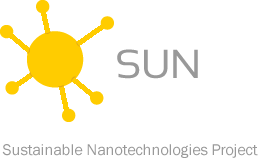
The achievement of safe nanoproducts requires an understanding of the properties, biological interactions, fate, risks and environmental impacts of manufactured nanomaterials (MN). The Sustainable Nanotechnology School aims to transfer the state of the art knowledge on these aspects from key experts to the new generation nano environmental, health and safety (EHS) professionals. In order to do so the school will highlight the best available experimental and modeling approaches and practices for physicochemical characterization, (eco)toxicity testing, exposure, risk, life-cycle impact assessment and decision support for sustainability of nanotechnologies and risk governance, taking various stakeholder perspectives and ethical issues into account. The course is structured to balance breadth and depth in these diverse topics, as well as build an integrative understanding of them, while providing an interactive learning environment and direct access to key experts from Europe. The Sustainable Nanotechnology School is organized in the frame of the major EU FP7 projects SUN, the MODENA Cost Action and ECONANOSORB.
Target audience
The 2nd Sustainable Nanotechnology School is especially designed for personnel from research and academic institutions as well as from industry, governmental agencies and hospital departments. The School is aimed at senior researchers, young scientists, PhD students and in fact anyone dealing with nanosciences, nanotechnologies and risk assessment of nanotechnology.
School topics
- Health and Ecological Risk Assessment of MN, including nano-bio interactions, nano(eco)toxicology and exposure estimation;
- Lifecycle Impact Assessment of MN;
- Safe-by-Design nanomanufacturing;
- Decision support for environmental, social and economic sustainability of nanotechnologies;
- Risk Governance of nanotechnologies;
The school includes lab training and computational and modelling practical courses intended to build an integrative understanding in the above topics, while providing an interactive learning environment and direct access to key experts from Europe.
